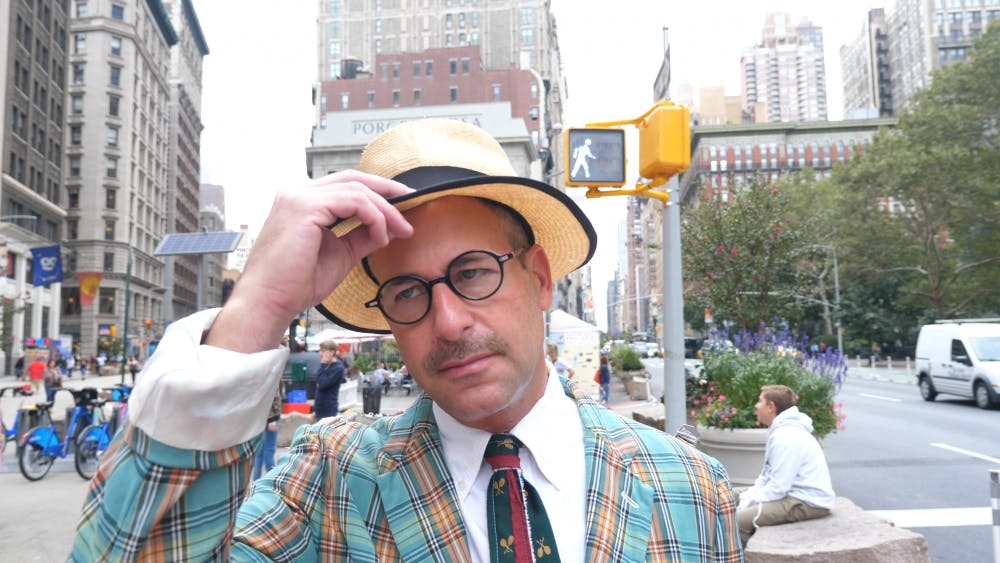Imagine going to class for three hours a week in the Writing Center, not having any homework due, and not knowing what to expect at all. The only thing you know is that you will be using your laptop and surfing the web with your classmates and your professor—definitely not something you would do in a typical class. There’s a class like that at Penn, and not just in your dreams. It’s called Wasting Time on the Internet (ENGL 111), taught by Kenneth Goldsmith, and it’s one of the many iconic classes Goldsmith teaches at Penn.
“It becomes a communal experience, surfing the web together,” Goldsmith explains. “We make up games, we have no agenda. For instance, we Skyped each other one time, all in the same room. Just these very stupid, basic things you do on the Internet that you don’t really think about, but what happens when you do them as a group? It becomes very social, almost a flash mob.”
To those who would reply that they’ve never thought about it that way, Goldsmith would respond: “Well, that’s the idea of school, to make you think about things differently.”
Goldsmith wears a tie, snipped in half carelessly, and a purposely patched up suit. In the late 80s, before teaching at Penn, Goldsmith was a sculptor. He sculpted books. “I started putting words on them and ultimately became more interested in the words than in the sculptures. Now I may be going back to it. I miss it.” He’s written several books over the course of roughly 20 years, and he’s “answered his questions” in his own writing.
Goldsmith is known for the unorthodox classes he teaches. One was called Uncreative Writing, which requires that students be wholly unoriginal in their work. In other words, they must plagiarize everything. Their first assignment: go home and retype five pages of something that already exists in the world—anything. Once in class, Goldsmith asks why everyone chose what they did, and this is where the magic happens.
“And suddenly, everyone’s got a great reason. And you realize that by the choice of what they showed you, their writing was autobiographical. They all had a relationship to a text and a story to go with it. So in a sense it’s very creative but not through conventional outlets.” Cutting and pasting, Goldsmith proves, can very well be a way of writing and creating on its own.
Goldsmith’s favorite class is a year–long seminar he teaches called Writing Through Art and Culture (ENGL 165), in conjunction with the Philadelphia Museum of Art. Students spend one year working with an artist, calling on them as a source of inspiration. It’s offered every other year, and it’s one of the major reasons why Goldsmith became a professor at Penn in the first place. Al Filreis, Faculty Director of the Kelly Writers House, invited him to become a fellow and teach this class (formerly with the Institute of Contemporary Art) in 2004.
At the time, Goldsmith had never taught a class before. Asked whether he does anything differently now, he calmly says, “I never prepare for a class. The energy just flows. I kind of direct the energy. I open up the space for possibilities and things to happen.”
“Can writing be unoriginal and still be moving? In a time in which language is copied and pasted, how can writing respond? How can writing poetry and novels be contemporary in a world that’s all language?” Goldsmith asks. “So I came to the end of my investigation fairly recently.”
Despite these questions, he will continue to teach, as he believes it keeps him above water. Next semester he’s teaching a class called The Art of Writing Badly (ENGL 111). The intention is to break writing rules to their most extreme and come up with new types of writing. Examples include short stories composed entirely of run on sentences inspired by James Joyce or writing with intentionally misspelled words. “Through error, we can probably express things that are better said than when done correctly,” Goldsmith says.
Right now, he’s working on writing the history of UbuWeb, where he is the founding editor. Ubu, as he calls it, is a 22–year–long project of online copying and distributing materials of the avant garde, for free. It began as a site for things like concrete poetry and visual poetry and has since become a space for all things avant garde. Ubu is actually older than Google. “When I first saw the Internet in 1995, I and many others realized that there was crazy potential there. I thought, ‘What a great place for art to be.’”
Goldsmith later embarked on a mission to print out the Internet—and he did. “We got the whole thing in a giant pile in Mexico City,” he remarks proudly.
As an artist, he cites artists like Basquiat and Haring as inspirations. “One great thing about being an artist is that you’re alone and you have your own ideas. You can make your own time and do things with your hands, you take naps in the middle of the day, play hookie, drink wine in the middle of the day, all that stuff.”
That lifestyle isn't one many Penn students foresee for themselves. When asked, Goldsmith tries to define success. He pauses for a moment, staring into space.
“Success is being loved. Artists more than anyone have a need to be loved. And even if artists appear to be antisocial, in the end, they want your approval. We want to show other people that we’re worthy of living such a privileged life.”
At Penn, it can often be difficult to reconnect with aspects of yourself that aren’t going to develop a resume or that aren’t considered marketable. Meeting Goldsmith is refreshing. Inspiring. He restores confidence in art and in pursuing what you love.
“It’s a room of potential, of free space,” Goldsmith says. “Let’s see where it goes.”







